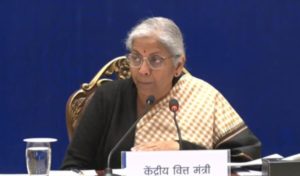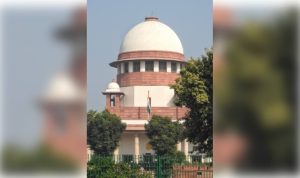SC notice to Centre on pleas against UAPA amendments

Photo: IANS
The Supreme Court of India (File Photo/IANS)
New Delhi: The Supreme Court on Friday issued notice to the Centre on a plea challenging the validity of turning an amendment into law to declare an individual as a terrorist.
The new section 35 of the Unlawful Activities (Prevention) Amendment (UAPA) Act allows the Centre to categorise any individual as terrorist and add the person’s identity in the Schedule 4 of the Act. It leads to accumulation of huge powers, which is unfettered and unbound, is anti-thesis to the Article 14 of the Constitution.
A PIL filed in the apex court by the Association for Protection of Civil Rights through advocate Fauzia Shakil claims the law imposes indirect restrictions on dissent and violated fundamental rights of citizens.
The petition claims the amendment infringes upon the right to reputation and dignity, which is a fundamental right under Article 21, without substantive and procedural due process.
“Notifying an individual as a terrorist without giving him an opportunity of being heard violates the individual’s right to reputation and dignity, which is a facet of right to life and personal liberty under Article 21 of the Constitution”, said the petition.
A Bench, headed by Chief Justice Ranjan Gogoi, sought a response from the Centre on the petition.
Another PIL, filed by Sajal Awasthi, a resident of Delhi, has urged the top court to declare the amendment unconstitutional. “The Act is in violation of the fundamental rights guaranteed under Article 14 (right to equality), 19 (right to free speech and expression) and 21 (right to life) in the Constitution,” said the petition.
Earlier, under the UAPA 1967, only an organisation could be notified as terrorist, stated the petition argued by senior advocate Shekhar Naphade.
Since the petitions are identical they have been tagged together.
“A person who is designated a terrorist, even if he is denotified subsequently faces a lifelong stigma and this tarnishes his reputation for life,” claimed the petitions. Designating a person as a terrorist on a mere of the belief of the government was arbitrary and excessive, they added.
Faujia’s petition claims a bare perusal of the amendment would reveal that there is no criminal consequence that follows a person’s designation as a terrorist. “No new offence has been created or new punishment provided. The amendment is grossly disproportionate and has no rationale nexus between the objects and means adopted to meet them”, said her petition.
The petitioners contend that the amendment provided no safeguards to a person notified as a terrorist.
Published on: Sep 6, 2019 at 20:43 IST
IANS




